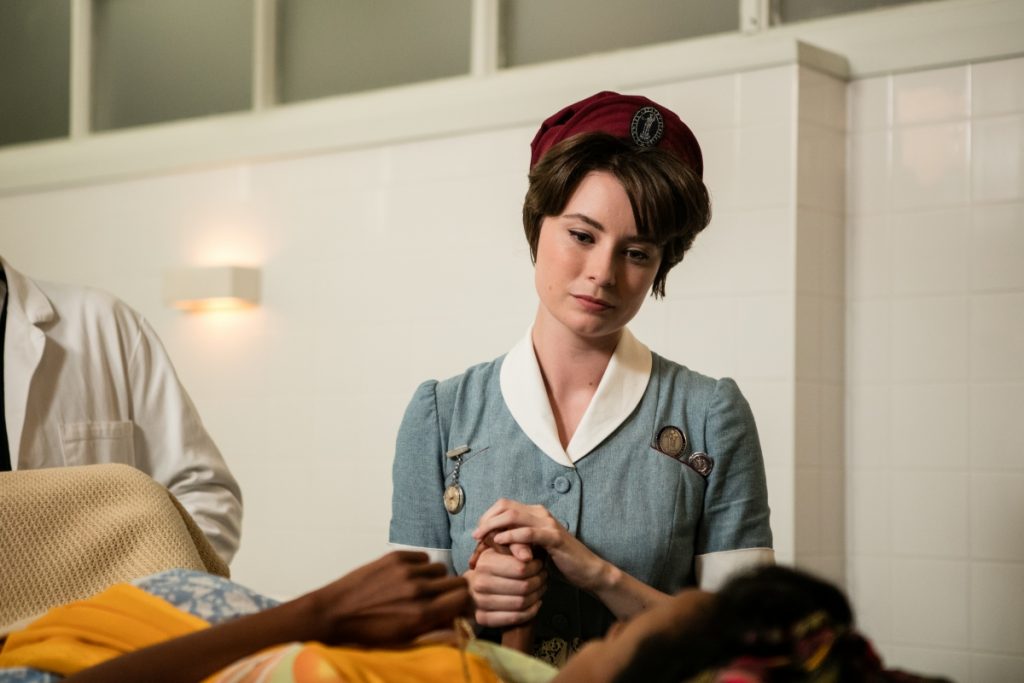
Call the Midwife is back for a sixth season Sundays at 7 p.m., through May 21. Read the Vanderbilt University School of Nursing guest blog each Monday morning for historical and contemporary context about the previous night’s episode. SPOILER ALERT: Some posts may contain spoilers.
By Bethany Domzal Sanders
Vanderbilt University School of Nursing
 This week’s Call the Midwife episode included the threat of nuclear war, electroshock therapy and female genital mutilation. It was enough to make me reach for the drink dentist Christopher (Jack Hawkins) offered to Trixie (Helen George) near the end of the episode. All joking aside, the issues raised in this episode remain pertinent and serious, particularly that of female genital mutilation.
This week’s Call the Midwife episode included the threat of nuclear war, electroshock therapy and female genital mutilation. It was enough to make me reach for the drink dentist Christopher (Jack Hawkins) offered to Trixie (Helen George) near the end of the episode. All joking aside, the issues raised in this episode remain pertinent and serious, particularly that of female genital mutilation.
This practice may also be referred to as cutting or circumcision and, as noted in the episode, it has been around for centuries. Practitioners of FGM often believe this will prepare the girl, typically between the ages of infancy and 15 years old, for adulthood and marriage; ensure premarital virginity; increase marriageability; and uphold tradition. FGM is also thought by some to be necessary for cleanliness, modesty and femininity.
There are currently approximately 200 million women and girls who have been cut, in 30 countries. FGM is most common in parts of Africa and in some areas in the Middle East and Asia. Immigrants from parts of the world where FGM is performed have carried the practice to other countries. There is no religious doctrine that supports FGM, although religious leaders within a community may promote it.
The shock Nurse Valerie Dyer (Jennifer Kirby) experienced upon witnessing the physical and emotional trauma of the mother (Yusra Warsama) in this episode is understandable, as well as her confusion about the mother’s willingness to subject her sister to the same procedure. FGM can be deeply culturally rooted, and the elimination of it depends more upon the decision of the community itself than legal ramifications. A number of international organizations continue to work to raise awareness, support women who have been subjected to FGM and provide evidence-based guidelines to healthcare providers caring for affected women.
I wanted so badly to reach out and grab the children’s anatomy book Nurse Barbara Gilbert (Charlotte Ritchie) was carrying, open it up and teach the mother about her own body so she might be empowered and understand why FGM was not necessary for any medical reason, and in fact poses a very real risk to women’s health.
Since 1997, the World Health Organization has called for an end to FGM, recognizing it as a violation of human rights. The United Nations has also adopted a resolution to eliminate the practice. As recently as last month, a Michigan grand jury indicted three people (two of whom were doctors) for conducting the practice. While FGM has been illegal in the US since 1996, this was the first indictment handed down.
Bethany Domzal Sanders, MSN, CNM, is a member of the Vanderbilt Nurse-Midwives, the clinical practice of the Vanderbilt University School of Nursing located at West End Women’s Health Center.